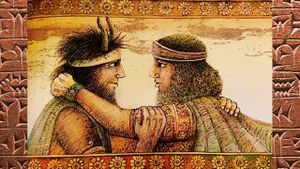Before beginning your work each week, read through the whole lesson so you know what to expect and understand what’s expected. Each tab corresponds to a lesson. All assignments are contained therein. Any questions should be posted to the class forum, and be sure to read my weekly feedback. |
| L1 | L2 | L3 | L4 | L5 | L6 | L7 |
August 19 – September 1: The Epic of Gilgamesh
Our first text is one of the oldest literary expressions, but some of its themes are remarkably contemporary.

Our editor writes:
| “ | [Gilgamesh is a] moving depiction of the bonds of friendship, of the quest for worldly renown, and of the tragic attempt to escape that death which is the common fate of humanity has a timeless resonance and appeal. Yet despite this immediate recognition of something profoundly familiar there is, because of this millennial gap in the history of its transmission, a strangeness and remoteness about the work that strikes us in virtually every line.[1] | ” |
Lesson Instructions and Explanation
|
|---|
| Due | Read | Do | Write | Test |
|---|---|---|---|---|
| 08/25 |
|
- | ||
| 09/01 |
|
Tip: Remember, you can always get assistance with anything on the class forum. If you need assistance with something more general, try the help forum. For course content assistance, see the study guides. ⚔️ |
Notes
| 🕒 08-26-2020 | 📆 Make an Appointment | 💬 Ask a Question | 📣 Leave Feedback |
- ↑ Lawall, Sarah; Mack, Maynard, eds. (1999). The Norton Anthology of World Masterpieces: The Western Tradition. 1 (Seventh ed.). New York: W. W. Norton & Company. p. 16.
- ↑ All course texts are available as PDFs on the forum for download.

